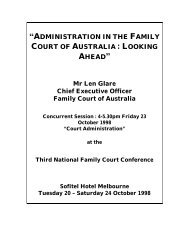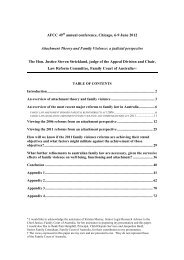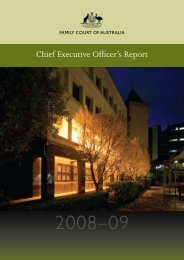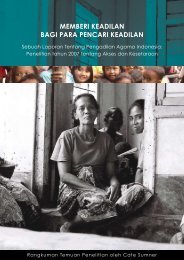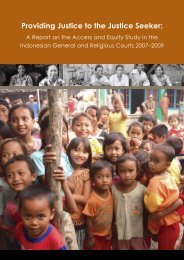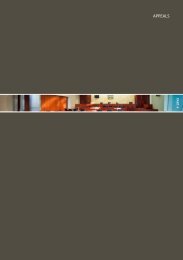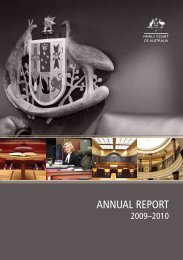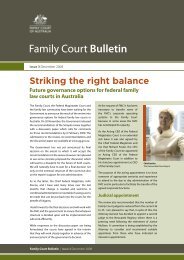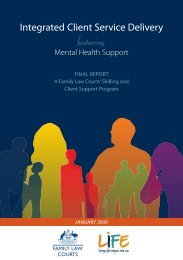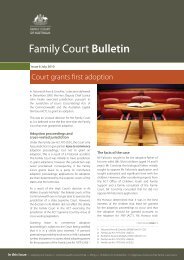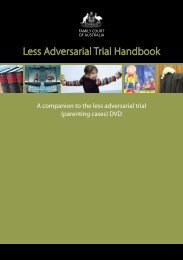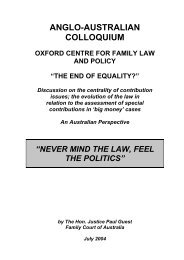Annual report [1997-98] - Family Court of Australia
Annual report [1997-98] - Family Court of Australia
Annual report [1997-98] - Family Court of Australia
Create successful ePaper yourself
Turn your PDF publications into a flip-book with our unique Google optimized e-Paper software.
The <strong>Family</strong> <strong>Court</strong> <strong>of</strong> <strong>Australia</strong> – annual <strong>report</strong> <strong>1997</strong>-<strong>98</strong><br />
Cases seen by the Counselling Service<br />
The <strong>Family</strong> <strong>Court</strong> Counselling Service works predominantly to help separated parents to<br />
reach agreement about the future arrangements for their children without litigation. This<br />
may involve reaching an agreement which they may then seek to have made into consent<br />
orders by the <strong>Court</strong>. Often it requires helping them to overcome emotional blocks, make<br />
significant adjustments to their changed circumstances and educate them about the needs<br />
<strong>of</strong> their children as preliminary steps in resolving the dispute. Agreement rates vary<br />
depending on when the parents approach the Counselling Service. Where they seek conciliation<br />
counselling before filing an application 78% reach agreement on at least one <strong>of</strong><br />
the substantive issues in dispute; where ordered by the <strong>Court</strong> to attend, 67% and 66% reach<br />
full or partial agreement depending on whether they attend before their first day in <strong>Court</strong><br />
or after this date respectively.<br />
In <strong>1997</strong>-<strong>98</strong> the Counselling Service dealt with 25,297 cases in person and 14,086 telephone<br />
cases, crisis calls and intake assessments. At the same time, 59,678 interviews in<br />
person were held and 34,116 telephone interviews, crisis calls and intake interviews were<br />
held.<br />
Of all the cases seen in person, 93% were seen in the Counselling Service’s conciliation<br />
counselling program. The remaining 7% <strong>of</strong> cases were those where a <strong>Family</strong> Report was<br />
prepared. These <strong>report</strong>s were ordered in disputed cases involving children and, <strong>of</strong> those<br />
cases, some reached agreement during and after the preparation <strong>of</strong> the <strong>report</strong> and did not<br />
proceed to a contested hearing. In <strong>report</strong> cases, the family has usually had previous contact<br />
with the counselling section for conciliation counselling. As the discussions that have taken<br />
place in conciliation counselling are not admissible as evidence in <strong>Court</strong>, the <strong>report</strong> is<br />
always prepared by a different <strong>Court</strong> counsellor.<br />
As many as 40% <strong>of</strong> all cases seen came on a voluntary basis to use the <strong>Court</strong>’s primary dispute<br />
resolution service. This is consistent with the <strong>Court</strong>’s encouragement that people<br />
resolve their disputes preferably without recourse to litigation. In all, 20% were referred to<br />
counselling by the <strong>Court</strong> after an application for a parenting order in relation to residence,<br />
contact or specific issues was filed but prior to the matter first coming before the <strong>Court</strong>;<br />
and a further 33% were referred by the <strong>Court</strong> after the first directions hearing.<br />
The year saw the introduction <strong>of</strong> fees on 1 July <strong>1997</strong> and the later disallowance <strong>of</strong> this by<br />
the Senate on 24 November resulting in fees being collected over a five-month period.<br />
This, combined with the announcement by the Federal Attorney-General that he was<br />
reviewing the delivery <strong>of</strong> dispute resolution services in family law, saw a reduction in the<br />
number <strong>of</strong> voluntary cases seen in person by the Counselling Service over the past year<br />
compared to the previous year (12,191 in 1996-97 compared to 10,187 in <strong>1997</strong>-<strong>98</strong>). In contrast,<br />
telephone services, which did not attract a fee, were not affected and were slightly up<br />
on last year (13,809 compared with 14,086).<br />
Overall there was an improvement in the number <strong>of</strong> registries that were able to meet the<br />
time standard for court-ordered conciliation counselling as indicated in the ‘Performance<br />
Indicators’section elsewhere in Part three <strong>of</strong> this Report. While some registries were not<br />
28


![Annual report [1997-98] - Family Court of Australia](https://img.yumpu.com/37244799/33/500x640/annual-report-1997-98-family-court-of-australia.jpg)
